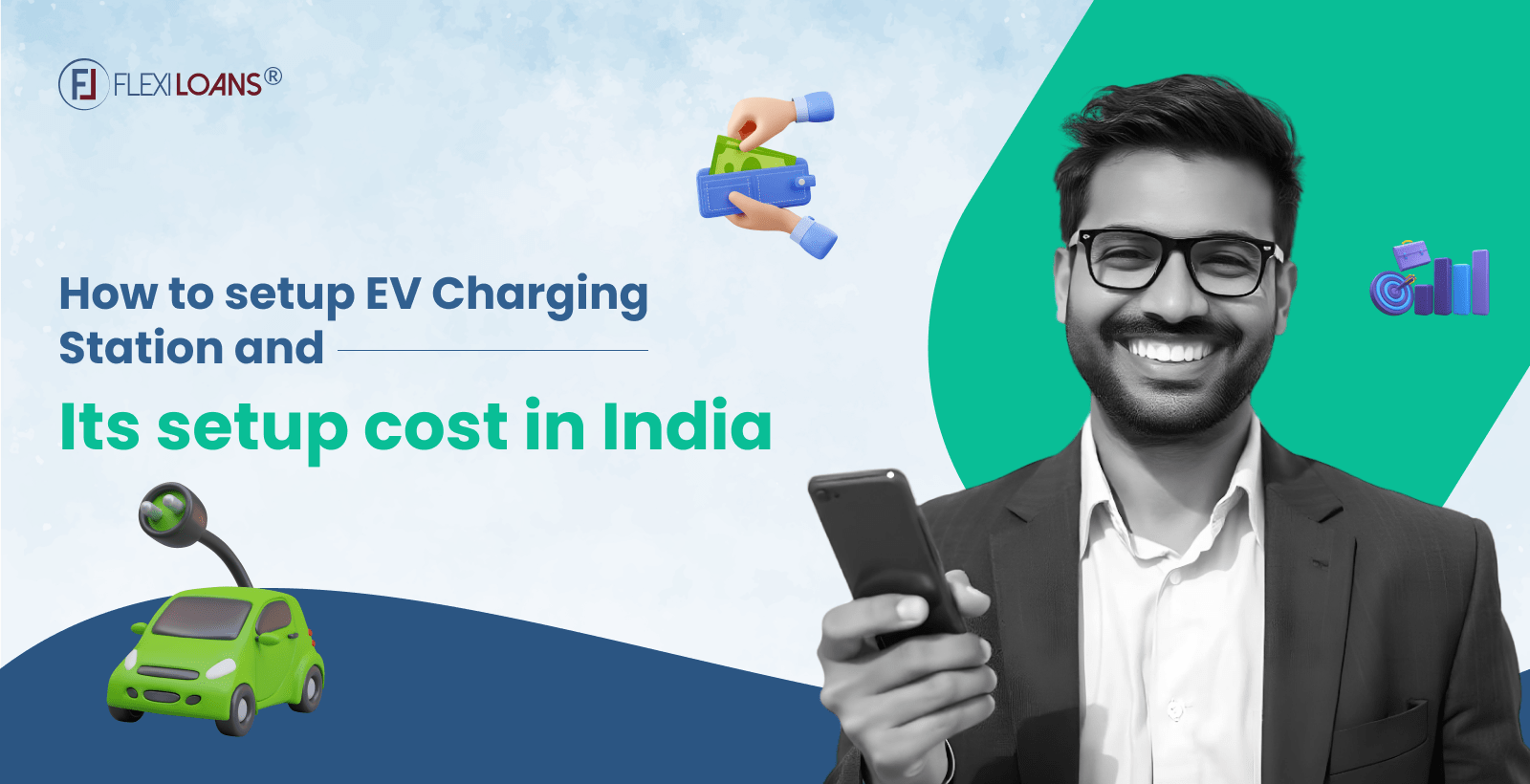Oct 14, 2024
Nov 30, 2025

The electric vehicle (EV) revolution is sweeping across India, with more and more people opting for eco-friendly transportation options. As the demand for EVs grows, so does the need for reliable and accessible EV charging stations. Setting up an EV charging station in India is now easier than ever, thanks to the government’s push for green mobility and the availability of EV charging station business loans. In this comprehensive guide, we’ll walk you through the process of setting up an EV charging station, the different types of EV chargers available in the market today, the costs involved in setting up an EV charging station, and how to secure funding for your EV charging station through business loans in India.
Types of EV Chargers
In India, authorities categorize Electric Vehicle (EV) chargers based on charging speed and technology. Here are the main types of EV chargers available:
1. AC (Alternating Current) Chargers
- Type of Charging: Slow to moderate
- Power Output: 3 kW to 22 kW
- Types:
- AC Level 1 (Slow Charging):
- Power: Up to 3.3 kW
- Common Usage: Home charging
- Connector: 3-pin socket, often used for two-wheelers or small four-wheelers.
- AC Level 2 (Moderate Charging):
- Power: 7.4 kW to 22 kW
- Common Usage: Public places, homes with dedicated chargers
- Connector: Type 2 socket, which is the global standard for most EVs
- AC Level 1 (Slow Charging):
2. DC (Direct Current) Chargers
- Type of Charging: Fast Charging
- Power Output: 25 kW to 150+ kW
- Types:
- DC Fast Chargers:
- Power: 25 kW to 50 kW
- Common Usage: Public fast charging stations, highways, commercial spaces
- Connector: CCS (Combined Charging System), CHAdeMO (used by some international brands)
- Ultra-Fast DC Chargers:
- Power: 100 kW to 350 kW
- Common Usage: Highways, commercial EV fleets
- Connector: CCS2, which supports ultra-fast charging for compatible EVs
- DC Fast Chargers:
3. Battery Swapping Stations
- Type of Charging: Indirect
- How It Works: Instead of charging the vehicle, the depleted battery is swapped with a fully charged one
- Common Usage: Primarily for two-wheelers and three-wheelers, often used in delivery fleets
Popular Charging Standards in India:
- CCS2 (Combined Charging System Type 2): Widely used for fast charging in most electric cars in India
- CHAdeMO: Less common, but still supported by some EVs
- Type 2 AC: Standard for AC charging, used in public and home charging
India is expanding its EV infrastructure, with more charging stations being developed across cities, highways and commercial zones. The government is also promoting the installation of both slow and fast chargers.
Also Read About the: How to get Mudra Loan
Government Guidelines for Setting EV Charging Stations
Setting up EV charging stations in India involves adhering to government guidelines aimed at promoting electric mobility, ensuring safety and standardising infrastructure. The Ministry of Power and the Bureau of Energy Efficiency (BEE), in collaboration with other agencies, formulated these guidelines. Here are the key highlights of the guidelines:
1. Permission and License: As per the Ministry of Power, any individual or entity can set up a public charging station without a license. They need to comply with the technical standards and safety norms prescribed by the government. However, setting up EV charging stations on public land (highways, streets, etc.) may require permission from local authorities.
2. Types of EV Charging Stations: Public Charging Stations (PCS) should be accessible to the general public. They must support both fast charging and slow charging modes and should have connectors such as CCS, CHAdeMO and Bharat AC/DC standard.
3. Tariff and Metering: The tariff for EV charging stations should not exceed the average cost of supply. Charging stations must have separate metering for electricity consumption to ensure fair billing for all consumers.
4. Safety and Certification: Stations must follow fire safety norms, and an authorized body should certify all equipment. Periodic maintenance and inspection of all charging equipment are necessary to ensure safety.
Infrastructural Requirements for Setting Up an EV Charging Station
- Location and Space: High-traffic areas, such as highways, urban centers, shopping malls, and office spaces, are ideal for setting up an EV charging station. You need sufficient parking space to accommodate multiple vehicles while charging. This could range from a single bay for a small installation to several bays for larger EV charging stations.
- Electrical infrastructure: Ensure a reliable power supply and sufficient electrical capacity at your chosen location. The charging station will need to be connected to the electricity generation company or local DISCOM. Some states offer special EV tariffs and subsidies to encourage the adoption of electric vehicles.
- Charging Equipment: Ensure your charging station is compatible with a wide range of charging standards, including CCS2, CHAdeMO, Type 2 AC and Bharat DC/AC. This will help you to cater to a larger customer base and increase revenue.
- Safety Features: You need to ensure that your charging station is compliant with safety standards. You will have to install proper grounding infrastructure, fire extinguishers, safety signage, isolation switches, CCTV cameras, etc. to ensure customer and equipment safety.
Step-by-Step Process for Setting Up an EV Charging Station in India
- Create a Business Model: Decide on a suitable business model for your EV charging station, such as pay-per-use, subscription-based or advertising-based. You can also tie up with an online service provider to enable remote booking and charging slots for customers. Choose a model that is financially viable and sustainable in the long run.
- Conduct a Feasibility Study: Assess project viability based on the location, power supply, charging standards and business model.
- Obtain Necessary Approvals: Seek required permits from the state electricity board, local municipal corporation and Ministry of Power.
- Install the Charging Equipment: Select a suitable charging station based on speed, power supply and compatibility.
- Test and Commission the Charging Station: Verify power supply, charging speed and compatibility with various types of EVs.
- Monitor and Maintain the Station: Ensure efficient operation with regular maintenance and technology upgrades.
Also Read About the: How to Instant Business Loan
Cost of Setting Up an EV Charging Station
The cost of setting up an EV charging station in India can vary depending on various factors, such as the type of charger, location and infrastructure requirements. Here’s a breakdown of the main costs involved:
- Equipment Costs: The cost of charging equipment varies based on the speed, power supply and standards.
- Installation Costs: This includes labor, cabling and installation materials. This cost varies based on the location and complexity of the setup.
- Operational Costs: Electricity is the biggest operational expense for an EV charging station. Other substantial costs include maintenance and upgrades.
- Permit and License Fees: The cost of obtaining necessary permits and licenses varies based on the location and type of charging station.
- Marketing Costs: Promoting your EV charging station through advertising and other channels will involve additional costs, depending on the mediums used.
The total cost of setting up a public charging station in India can range from ₹1 lakh to ₹50 lakh, depending on the type of charger and infrastructure requirements.
Financing Your EV Charging Station with an EV Charging Station Business Loan
As an entrepreneur, you can apply for business loans that are specifically designed for setting up an EV charging station. Such loans cover initial investment required for the business including equipment, installation, operational costs, etc. Therefore, they ensure a smooth setup process.
Benefits of Setting up EV Charging Stations
- Support for EV Adoption: Easy accessibility to charging stations reduces range anxiety, thus encouraging more people to switch to electric vehicles.
- Reduced Carbon Emissions: EVs produce zero tailpipe emissions and charging them via renewable energy sources significantly reduces greenhouse gas emissions. This is extremely beneficial for the environment.
- Sustainability Initiatives: The promotion of EV charging stations aligns with sustainability goals, hence enhancing a company / organisation’s green image.
- Early Mover Advantage: As the EV market grows, early investment in charging infrastructure can future-proof your business against shifting transportation trends.
Conclusion
Setting up an EV charging station in India presents a promising business opportunity as the country transitions towards cleaner and greener transportation alternatives. By understanding the different types of EV chargers available in the market, considering key factors like location and power supply for your EV charging station business, and following a well-thought-out plan for your business, you can establish successful and thriving EV charging stations.
While costs related to equipment, installation and operations can be significant, securing an EV charging station business loan can help mitigate financial challenges. Additionally, the Indian government’s incentives, such as subsidies, tax exemptions and priority lending, support the growth of EV charging infrastructure throughout the country.
If you’re looking to set up an EV charging station and need financial assistance, FlexiLoans offers quick and hassle-free collateral-free business loans and MSME loans for new businesses. With minimal documentation and flexible repayment options, FlexiLoans simplifies the process of securing a business loan in India. To learn more about our financing solutions, you can read through the following blogs:
- Udyam Registration – Online Process and Benefits
- Best Small Business Loan Options for Startups in India
- Advantages of Business Loans
- How to improve Cash Flow Management
FAQs
There are three main types of EV chargers in India:
1. AC chargers (slow and moderate charging)
2. DC chargers (fast charging)
3. Battery swapping stations
You can apply for a business loan, specifically an EV charging station business loan, to cover the costs involved in setting up the charging infrastructure. FlexiLoans offers quick and hassle-free MSME loans for new businesses to easily avail of the required funding.
The Indian government offers various incentives, such as the FAME II Scheme, GST exemption, capital subsidy, income tax exemption, priority lending, EV charging corridors and public-private partnerships, to encourage the development of EV charging stations.
To promote your EV charging station, utilise advertising, social media and marketing channels to reach your target audience. Highlighting the convenience, accessibility and eco-friendliness of your charging station can help attract EV owners.







